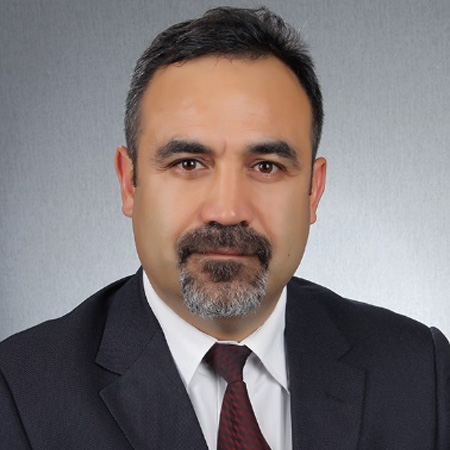
Professor of Biochemistry
-
University of Health Sciences
Istanbul, Turkey
Phone: 90 506 458 0271
E-mail: yusuf.tutar@sbu.edu.tr
Education
| DEGREE | DEPARTMENT | UNIVERSITY | YEAR |
| Ph.D | Biochemistry and Genetics | National Institute of Health, NIDDK | 2003-2005 |
| Ph.D | Molecular Biology and Biochemistry | Rutgers University | 2002-2003 |
| Graduate PhD | Biochemistry | Texas Tech University | 1998-2003 |
| Graduate MSc | Biochemistry and Biophysics | Oregon StateUniversity | 1996-1998 |
Biography
Dr. Yusuf TUTAR obtained his M.Sc. and Ph.D. at Oregon State University and Texas Tech University respectively. He pursued his postdoctoral study at National Institutes of Health (NIH/NIDDK), USA. His researchfocuses on Biochemistry, Biophysics, Genetics, and Molecular Biology with specialization in the fields of protein structure-function, protein folding, prion, microrna, pseudogenes, molecularcancer, proteomics, genomics, protein expression and characterization by spectroscopic and calorimetric methods. Dr. Tutar currently continues his research on drug design at University of Health Sciences, Istanbul, Turkey.
Research Interest
- Molecular Cancer Research and epigenetic (RT-PCR and Microarray).
- MicroRNA, pseudogenes, and transfection.
- Prion, translation termination in eukaryotes, and transcription initiation in prokaryotes.
- Investigating structure-function relationship of biological macromolecules with biochemical, biophysical, genetics and molecular biological methods.
- Recombinant DNA technology, molecular sub-cloning, transformation and protein expression.
- Drug design, docking, molecular dynamics.
- Nanoparticles for drug targeting.
- Protein purification (Heat shock, Catabolite repressorand S100P proteins) and characterisation (Spectroscopy:Fluorescence, Luminescence, CD, FTIR; Calorimetry: NanoDSC and ITC; Chromatography: HPLC and FPLC; Other techniques: MALDI-TOF, GC, SPR)
Scientific Activities
Employment History
| 2017-Current | Professor, Biochemistry Division, Faculty of Pharmacy, University of Health Sciences |
| 2013-2017 | Professor, Biochemistry Division,Faculty of Pharmacy, Cumhuriyet University. |
| 2012-2013 | Associate Professor, Biochemistry Division, Faculty of Pharmacy, Cumhuriyet University. |
| 2008-2012 | Associate Professor, Biochemistry Division, Faculty of Medicine(Adjunct) Cumhuriyet University |
| 2005–2008 | Assistant Professor, Biochemistry Department, Faculty of Science,Cumhuriyet University |
| 1998–2003 | TA/RA , Biochemistry Department, Texas Tech University |
Professional Activities
Teaching Activities
Under Graduate Courses
Biochemistry, Biophysics (applied) Biophysical Chemistry (molecular and applied), General Chemistry, General Chemistry Lab, Biochemistry Lab, Food chemistry, Environmental Chemistry, Structure & Activity Relationships in Drugs.
Graduate Courses
Gen Regulation and Cell Proliferation in Cancer, Protein Engineering, Bioinformatics, Proteomics, Molecular Biotechnology, Molecular Biophysics and Instrumental Analysis, Advances in Molecular Research, Structure and function relationships of Biochemical Macromolecules, Conformational Behavior of Biomolecules and Biophysical Methods, Bacteriology, Nucleic Acids, Fluorescence Spectroscopy and Biochemical Applications, Water and Organism’s Liquids.
Honors and Awards
- Board Member, World Association of Medical Editors, USA, 2014
- Asian Council of Science Editors, BAE, 2013
- Visiting Scientist, National Institute of Health, Cancer Institute, 2011
- Outstanding Young Scientist Award, Turkish National Academy of Sciences, 2008
- Principal Investigator Fellowship, FEBS, 2007
- Young Scientist Fellowship, FEBS, 2006
- Fellows award for research Excellence, National Institute of Health, 2005
- Visiting Fellow, National Institute of Health, 2003
- University Scholarship, TexasTechUniversity, 2002
- Teaching Academy Fellow, TexasTech University, 2002
- Outstanding Teaching Assistant, TexasTech University, 2002
- Outstanding Research in Biological Science, E. New MexicoUniversity, 2002
- Travel and accommodation award, TexasTechUniversity, 2001
- Honor Society Membership, Texas Tech University, 2000-Current
- National Scholarship for graduate studies in the USA, Turkish Ministry of Education, 1995
- Graduated with honors, Cumhuriyet University, Turkey, 1994
Publications
- Tumor Targeting of Polymeric Nanoparticles Conjugated with Peptides, Saccharides,and Small Molecules for Anticancer Drugs, Current Pharmaceutical Design, 2017, 23, 1-9 Bayram B, Özgür A,Tutar L,Tutar Y.
- Anti-Cancer Activities of Manganese Based Photoactivatable CO-Releasing Complexes (PhotoCORMs) with Benzimidazole Derivative Ligands. Transition Metal Chem., 2017, In Press Üstün E., Özgür A., Coskun KA, Demir S., Özdemir İ., Tutar Y.
- Structure-Function Based Drug Design for Cancer Therapeutics Current Pharmaceutical Biotechnology, 2016, 17,14, Tutar Y.
- Design, Synthesis, and evaluation of Heat Shock Protein 90 Inhibitors In Human Breast Cancer and Its Metastasis
- Current Pharmaceutical Biotechnology, 20016 17,:14, 2-17.Gümüş M, Özgür, A, Tutar L, Koca İ, Tutar Y.
- Regulation of oncogenic genes by MicroRNAs and pseudogenes in human lung cancer. Tutar Y, Özgür A, Tutar E, Tutar L, Pulliero A, Izzotti A.Biomed Pharmacother. 2016 Aug 20;83:1182-1190
- Co-Releasing Properties and Anti-Cancer Activities of Novel Manganese Complexes with Imidazole/Benzimidazole Ligands. Journal of Coordination Chemistry, 2016 Üstün E., Özgür A., Coskun KA, Demir S., Özdemir I., Tutar Y.
- Design and synthesis of pyrimidinyl acyl thioureas as novel Hsp90 inhibitors in invasive ductal breast cancer and its bone metastasis. Eur J Med Chem, 2016:122:280-290. Koca İ, Özgür A, Er M, Gümüş M, Açikalin Coşkun K, Tutar Y.
- Heat Shock Protein 90 Inhibition in Cancer Drug Discovery: From Chemistry to Futural Clinical Applications.
- Anticancer Agents in Medicinal Chemistry, 2015. [Epub ahead of print]. Ozgur A,Tutar Y.
- Therapeutic Targeting of microRNAs in Cancer: Future Perspectives. Drug Development Research, 2015. [Epub ahead of print] Tutar L, Tutar E, Ozgur A, Tutar Y.
- A Novel Approach to Inhibit Heat Shock Response as Anticancer Strategy by Coumarine Compounds Containing Thiazole Skeleton. Anticancer Agents in Medicinal Chemistry, 2015. [Epub ahead of print] PMID: 25846761.Koca I, Gumus M, Ozgur A, Disli A, Tutar Y.
- Isolation and characterization of Heat Shock Protein 100 from Toxoplasma gondii RH Strain. Experimental Parasitology, 2015 Feb 26;153:91-97. doi: 10.1016/j.exppara.2015.02.007. [Epubahead of print] PMID:25728232
- Coskun KA, Tutar Y. Acyl Thiourea Derivatives Containing Pyrazole Ring Selective Targeting of Human Aurora Kinases in Breast and Bone Cancer. Letters in Drug Design & Discovery Vol. 12, 1, 2015.
- Ozgur A, Yenidunya E, Koca İ, Tutar Y. Prion; Mechanism and Function-Editorial.Current Pharmaceutical Biotechnology, 2014, Vol. 15, No. 11.
- Tutar Y.Regulation of Heat Shock Proteins by miRNAs in Human Breast Cancer. MicroRNA Vol. 3, No.2, 2014.
- Aykut O, Tutar Y. Controlled Release and Drug Delivery in Diseases-Editorial. Protein and Peptide Letters. 2014, 21 (11):1.
- Tutar Y.miRNA and Cancer;computational and experimental approaches Curr Pharm Biotechnol. 2014, 15 (5):429.
- Tutar Y. miRNA and Cancer; an overview. Curr Pharm Biotechnol. 2014, 15 (5):430-437.
- Tutar L, Tutar E, Tutar Y. Synthesis, molecular docking, and antitumoral activity of alnustone-like compounds against estrogen receptor alpha-positive human breast cancer. 2014, DOI: 10.3906/kim-1408-72.
- Küçükoğlu K, Seçinti H, Özgür A, Seçen H, Tutar Y.The Relation Between microRNA 221, 222, 146b and p27Kip1 Protein mRNA Secretions and ClinicopathologicalParameters in Thyroid Cancers and the Alteration of miRNA Secretion in the presence of Hashimoto Thyroiditis. Experimental and Clinical Endocrinology & Diabetes.2014 Mar;122(3):137-143.
- Acibucu F, Dokmetas S, Tutar Y., Elagoz S, Kilicli F.Dynamic Fluctuations Provide the Basis of a Conformational Switch Mechanism in Apo Cyclic AMP Receptor Protein.Plos Computational Biology. 2013 Jul;9(7): e1003141.
- Fas B.A., Tutar Y., Haliloglu T.Important Clinical Applications of Protein Based Nanoparticles. Current Proteomics. Vol 10 (4) 334-340, 2013.
- Ergul M, Ergul M, Tutar Y.Isolation and Identification of Free Living Environmental Isolates of Amoebae Samples in Sivas, Turkey.Biomed Research International. Volume 2013 (2013), Article ID 675145.
- Coskun A., Celik S, Tutar L, Elaldi N, Tutar Y.Reply to Letter to the Editor: The Role of Preoperative Oxidative Stress and Mandibular Third Molar Postoperative Outcome.Int J Oral and Maxill Surg.2013 Nov; 42(11):1500-1501.
- Gulnahar Y., Kosger H. H., Tutar Y.Gok1-Hsp40 Isolation from Toxoplasma gondii. Protein and Peptide Letters, 2013 Dec; 20(12):1294-1302.
- Coskun.A., Ozgur A, Otag B., MunganM,Tutar Y.Therapeutic Proteins.Protein and Peptide Letters, 2013 Dec; 20(12):1365-1373.
- Ozgur A., Tutar Y.Prelude to Therapeutic Proteins.Protein and Peptide Letters, 2013 Dec; 20(12):1293.
- Tutar Y. Synthesis and Anticancer Activity of Acyl ThioureasBearing PyrazoleMoiety. Bioorg Med Chem. 2013 Jul 1, 21(13): 3859-3865.
- Koca I, Ozgür A, CoskunA, Tutar Y. Hsp70 from Cyprinionmacrostomusmacrostomus and Garrarufaobtuse: Stability and Stability-Dependent Activity. Biochemistry (Moscow) 2013, 78 (5) 531-538.
- Tutar Y., Coskun A., Tutar L. A Comparison of Piezo Surgery and Conventional Surgery by Hsp70 Expression.
- Int J Oral and Maxill Surg.2013 Apr;42(4):508-10.
- Gulnahar Y., Kosger H. H., Tutar Y. Pseudogenes. Comparative and Functional Genomics. 2012, doi: 10.1155/2012/424526.
- TutarY. Neglected role of cAMP receptor protein monomer. MolBiol Rep. 2012 39 (4) 4261-4265.
- Tutar Y.Heat Shock Protein 70 Purification and Characterization from Cyprinionmacrastomusmacrastomus and Garrarufa obtuse.
- Tutar Y., Okan S. J. Thermal Biology.2012 37 95-99.Hsp70 in Oncology. Recent Pat DNA Gene Seq. 2011 5 (3) 214-218.
- Tutar Y. Heat, pH Induced Aggregation and Surface Hydrophobicity of S. cerevesiae Ssa1 protein.
- Protein J. 2010 29 (7) 501-508.
- Tutar Y., Arslan D., Tutar L.Editorial. Curr Pharm Biotechnol. 2010 11 (2) 138.
- Tutar Y. Heat Shock Proteins; An Overview Curr Pharm Biotechnol. 2010 11 (2) 216-222.
- Tutar L., Tutar Y.Prelude; Cellular Mechanics. Theme Issue. Guest Editor Protein and Peptide Letters 2009 16 (6) 570.
- Tutar Y. Syn-, anti-, and Finally Both: cyclic AMP Conformation Altered CRP Dependent Transcription Initiation Mechanism InE. coli lac Operon.Cell. Biochem. Funct. 2008 Jun;26 (4):399-405. Review
- Tutar Y.Ydj1 but not Sis1 stabilize Hsp70 protein in vitro. Biopolymers. 2008 Mar;89(3):171-174.

